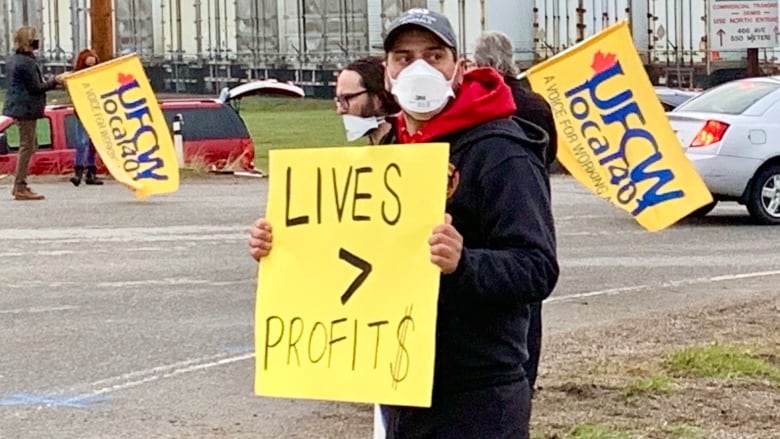Food Inspectors Could Face Sanctions If They Refuse Reassignment to COVID-19-Infected Meat Plants

The union representing Canada’s food inspectors says Ottawa is threatening disciplinary action against employees who refuse to be reassigned to work at COVID-19-infected meat plants
by Kathleen Harris – CBC News
The Agriculture Union, which represents about 1,000 inspectors at slaughterhouses and meat processing facilities, said the Canadian Food Inspection Agency (CFIA) wants to redeploy employees who normally work in other areas to work in the meat sector, with only a brief training period.
If they refuse to become “instant” meat inspectors, they could face sanctions for insubordination, the union was told.
“What concerns me most is that people will be forced into these environments when they don’t feel comfortable working in the slaughter establishments where there’s a threat of COVID-19,” union president Fabian Murphy told CBC News.
Murphy said the backfill employees are getting a “crash course” training of about two days. He could not provide a number of how many are required to redeploy, but said disciplinary action for those who don’t agree could be suspension or even termination.
“What concerns me most is that people will be forced into these environments when they don’t feel comfortable working in the slaughter establishments where there’s a threat of COVID-19.”
CFIA said in a statement that employees always have the right to refuse work if they have “reasonable cause to believe there is danger,” and said there have been no cases of refusal to work to date.Meat processing plants and slaughterhouses have been hard hit by the coronavirus, which causes the COVID-19 illness. The Cargill plant in Alberta, where there have been about 1,000 reported cases, is now considered the largest single-site outbreak in North America.
The union that represents the company’s workers is asking a court to stop work at the plant and has also filed unfair labour practice complaints against Cargill and the province. Inspectors fall under federal jurisdiction.
Over the weekend, the Cargill plant in Chambly, Que. announced it’s temporarily shutting down after an outbreak infected 13 per cent of its workforce.
Deputy Prime Minister Chrystia Freeland told a virtual House of Commons session last week that workers should not be obliged to go to work if they feel unsafe.
“It is absolutely the case that no Canadian should feel they have to work in an environment that is unsafe,” she said.
“The government, of course, should not penalize workers for doing the right thing and declining to go to work in unsafe conditions.”
90 new ’emergency’ hires
Aside from worker reassignments, CFIA told CBC News it has hired 90 “emergency” staff to help limit the transmission of COVID-19 as the virus continues to spread fast in meat processing facilities.
The additional hires — 70 inspectors and 20 veterinarians — are to “minimize the need for movement of staff between work locations,” the CFIA said in a statement.
The agency is taking steps to limit the number of facilities each inspector visits to prevent transmission, but the agency acknowledges that’s not always possible.
“The CFIA is making best efforts to have veterinarians and inspectors work in a single establishment. However, current industry demands may require same-day oversight or inspection services at more than one establishment,” it said.
Personal support workers visiting multiple long-term care facilities in a day has been flagged as a likely source of spreading the virus.
34 employees with COVID-19
CFIA said it is aware of 34 inspectors who have tested positive for COVID-19 since March 23. The union said dozens more have been tested, but results have not yet come in.
When inspectors are required to visit multiple establishments, the agency said they must follow health and safety protocols in place at each location to mitigate the risk of infection, including:
Completing health assessment questionnaires before and after each shift. Taking part in the plant’s screening processes for employees “where appropriate to do so.” Using masks or face shields while in the establishment. “Understanding that appropriate physical distancing measures are not always possible in some work environments, the CFIA is providing masks and face shields for its employees — primarily for meat inspectors working in federally licenced slaughter establishments. The CFIA is also exploring additional preventive measures for its employees,” it said.
Asked what those additional measures are, CFIA said it’s working with Public Services and Procurement Canada to procure additional personal protection equipment (PPE).
The union said the PPE provided is not adequate and that employees need N95 masks to prevent infection.
Up to provinces
A spokesperson for Agriculture Minister Marie-Claude Bibeau’s office said the government recognizes the health concerns of people who work in some meat plants, and that it’s up to the provinces to ensure they are properly protected.
“Local and provincial public health authorities across the country are working with all plants to ensure that they are following the best advice of the Public Health Agency of Canada. CFIA staff rely on the worker safety determination of the local and provincial health authorities, too,” according to a statement.
“CFIA inspectors are in these plants to verify that safe food regulations are properly implemented, and we invested $20 million to help ensure they have the resources to do their job during this challenging time.”
With files from the CBC’s Olivia Stefanovich












